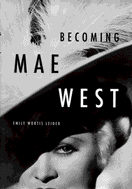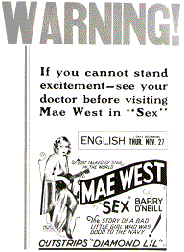


-- Author's Statement
--
ON BECOMING MAE WEST
For a biographer interested, as I am, in American women, changing sex roles, and the early part of this century, Mae West is a dream of a subject. As a performer in vaudeville, of the legitimate stage, and, after 1932, in movies, she kept testing limits, undermining Victorian and Christian norms of feminine propriety. Her provocative undulations and suggestive lines often got her caught in the cross-fire between naysaying champions of restraint and gentility and enthusiasts of a new ethos of pleasure-seeking, acquisitiveness, self-centeredness, and freedom from constraint.
Power and control mattered most to Mae West. She steered clear of marriage, or any other committed relationship, because she wanted to focus on herself, unimpeded. She began to write her own lines before she was out of her teens. By the time she approached her thirtieth birthday she'd decided that the surest way to take charge was to write her own vehicles. With help from uncredited co-writers, she wrote and produced several scandalous plays. Two of these, The Drag and Pleasure Man, focused on gay men whose senses of humor and campy style synchronized with her own.

Sex, in which she starred as floozy Margy LaMont, sent her to jail for ten days for indecency and turned her into a tabloid sensation. Diamond Lil, which highlighted her hourglass figure and married 1890s fashions to 1920s outrageousness, made her a star. In Hollywood in the early 1930s, Diamond Lil became the Depression-smashing box-office bonanza She Done Him Wrong.Becoming Mae West is the first biography to focus on the dynamic but little known early part of Mae West's life, before she was hobbled by Hays Office censors and by her own unwillingness to change her formula. It asks: How did Mae West get to be the internationally recognized icon, the quipster quoted around the world and imitated by legions? It examines the dynamic between Mae and her ambitious German-born mother, her brawny wiseacre father, her alcoholic sister, and her dependent brother. It reconstructs her early stage performances, the moves she made, lines she spoke, and songs she sang, and details their impact on audiences, managers, and critics. It is the only biography to spotlight and quote from the plays, the first to look at the words she spoke on camera, and those the censors disallowed.
Someone asked me recently, what makes Mae West endure? It's her words I think, zingers like "Goodness had nothing to do with it," or her signature "Come up and see me sometime," She used humor to get us on her side. What could be more potent?
-- Emily Wortis Leider